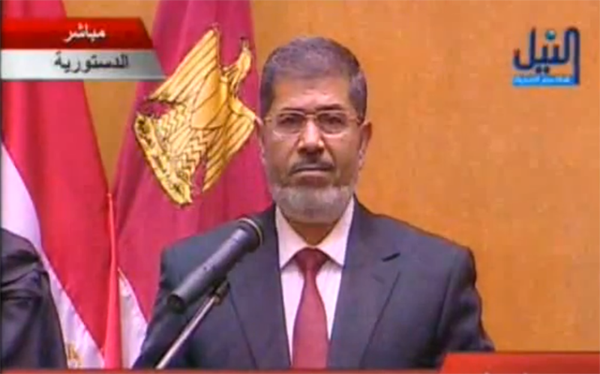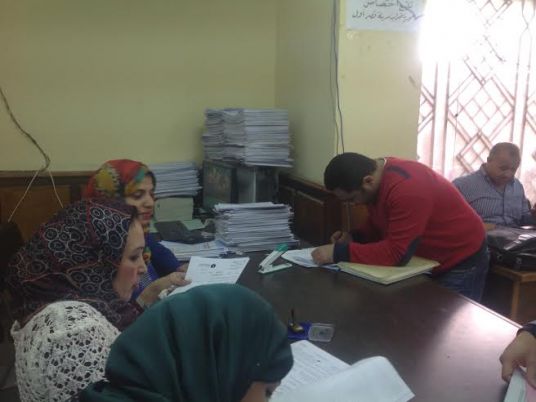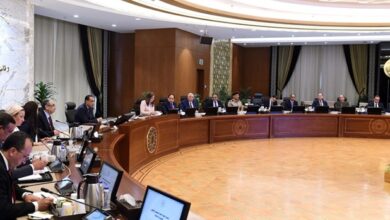
With the swearing-in ceremony of Mohamed Morsy last week, executive powers were transferred from the Supreme Council of the Armed Forces to Egypt’s first democratically elected president — a milestone set to be followed by the appointment of a new Cabinet.
In recent days, the debate over the type of cabinet needed has flared. Some groups insist that Morsy deliver on his electoral promise of appointing a national coalition government, while others contend that it is time to put the Islamist project to the test and have the Muslim Brotherhood and its ideological allies take on the Cabinet’s responsibilities.
During the run-up to the presidential election’s second round, Morsy — the outgoing president of the Brotherhood’s Freedom and Justice Party — made several pledges, hoping to attract secular votes and defeat his opponent, former Prime Minister Ahmed Shafiq. Among Morsy’s promises was the appointment of a coalition government led by a prime minister from outside the FJP.
While the typical definition of a coalition government is an executive organ in which each political party has a specific share of ministerial portfolios corresponding to its political weight, Islamists are interpreting Morsy’s pledge differently.
Hatem Abdel Azim, a former FJP representative in the now-dissolved People’s Assembly, said that both the party and the president do not envision a coalition government in the strict sense of the word.
“A coalition government means a government in which all political forces are represented, but we mean here a government that all political forces can approve of,” Abdel Azim explained.
Such a government would be a cabinet dominated by technocrats who can gain the support of all political forces, he said. But he added that not all the ministers would be technocrats.
“The Cabinet will also include members of political parties, but at least the prime minister and some of the important ministers will be technocrats,” he said, adding that these technocrats would be expected to carry out Morsy’s electoral platform.
The appointment of independent technocrats would help avoid more splits among political forces, Abdel Azim said.
But civilian political forces might not be the sole players in the appointment of ministers. Several pundits maintain that the generals would seek a role in selecting the ministers who hold crucial portfolios, commonly called “sovereign” ministries. These would include the Defense, Interior, Foreign, Finance and Information ministries.
“The president will not accept that,” Abdel Azim said. “There will only be consultations with [SCAF] about the defense minister.”
The FJP is holding talks with the Salafi-oriented Nour Party and the liberal Wafd Party, as well as the Kefaya and April 6 Youth movements, to name candidates for the new cabinet, the former lawmaker said.
“Some forces have suggested [Mohamed] ElBaradei [for prime minister], namely the Kefaya movement and April 6, but we have not agreed on that yet,” said Abdel Azim.
Some media reports have said the Nour Party is opposed to the appointment of the longtime reform advocate because of his liberal leanings. But party spokesperson Nader Bakkar denied these reports, affirming that his party “has no objection to ElBaradei’s persona.”
While Abdel Azim says that no potential candidate has been contacted yet, Bakkar says his party learned from the president’s office that ElBaradei was offered the position.
In the meantime, Bakkar said the Nour Party and Morsy have already agreed on three broad criteria for the new ministers. First, the prime minister should be a technocrat with no affiliation to any political party; second, he or she should have a free hand in picking ministers.
“We do not want to repeat the mistakes of the past and have the prime minister blame his failure on not having the freedom to choose [his ministers],” Bakkar said.
He said the party does not want a prime minister who would serve as the president’s secretary.
“We want him to have clear authorities and be a technocrat, to keep him away from political sensitivities between political parties,” he said.
Third, Islamist parties should not be represented according to the political weight they held in Parliament — which was dissolved by a court ruling last month — but according to their executive caliber, Bakkar said.
Magdy Sobhy, a political analyst at Al-Ahram Center for Political and Strategic Studies, said the FJP discourse on the need for technocratic ministers is meant to evade Morsy’s initial promise about forming a coalition with other political forces.
“These people are joking around. They want a cabinet that they themselves appoint but in the meantime would not be seen as belonging to them,” he said.
“At the end of the day, [the Brothers] will bring technocrats who they trust, which means people who are close to them,” he expected.
Some secular parties have the same suspicions.
“We were not given any official offers by the president, his aides or any of his party’s leaders about forming a national coalition government,” said Farid Zahran, a leader of the secular Egyptian Social Democratic Party.
“There have been no serious negotiations with political parties about the Cabinet’s ministers or program,” he added, ruling out that the Brothers are interested in forming a genuine coalition.
“The Brothers had refused to reach a consensus over the constitution, which cannot actually be written without consensus. How would you expect them to build consensus over the Cabinet?” Zahran said.
Since the ouster of Hosni Mubarak last February, secular-Islamist relations have been strained over different details of the transition. The standoff reached its climax during the Parliament’s election of the 100-member assembly tasked with writing the constitution. While secularists accused the Brothers and Salafis of hijacking the assembly to write a constitution that would pave the way for a religious state, Islamists said the non-Islamist parliamentary minority was seeking more influence than its actual weight.
However, not all secularists aspire for a genuine coalition government. Amr Hamzawy, a leader of the secular Egypt Freedom Party and a former MP, stands as one of the most outspoken opponents of the proposition.
“I am against the idea of having a large coalition government because this means that the government will have no clear political platform. People need a political platform that they can hold the president accountable for,” Hamzawy told Egypt Independent in a phone interview.
He said Morsy’s political project should be reflected in the Cabinet, which should be formed by his party and its allies.
“As for other parties, they can form a constructive opposition. This is how things are,” Hamzawy said.
Until Morsy announces the new ministers for the Cabinet, the outgoing SCAF-appointed ministers are running a caretaker government. It remains unclear when the announcement will be made.
Morsy had run for president raising the banner of the Brotherhood’s Renaissance Project. The ambitious platform envisages comprehensive development modeled after that of several developing countries, including Turkey, Malaysia, Singapore and others.
Governing with non-Islamist partners would put the Brotherhood’s 84-year-old political project to the test for the first time. Given the tremendous political, social and economic hurdles they face, many experts say Islamists run a very high risk of failure — a fate that might discredit the Islamist project once and for all.
This piece was originally published in Egypt Independent's weekly print edition.




